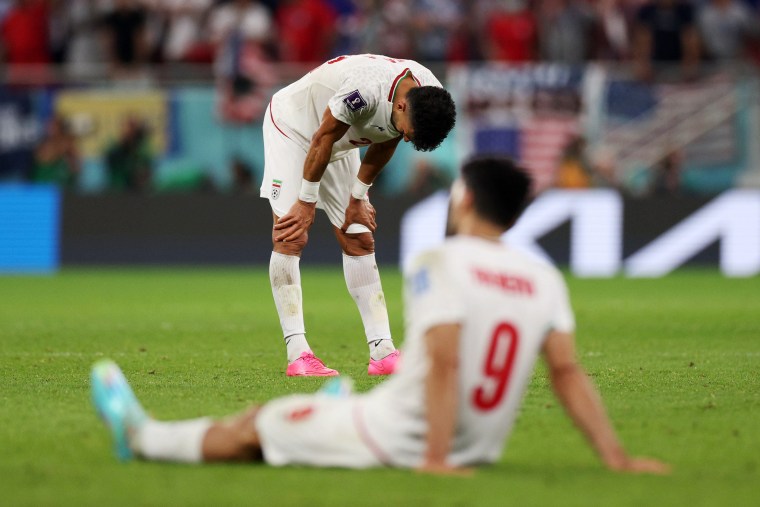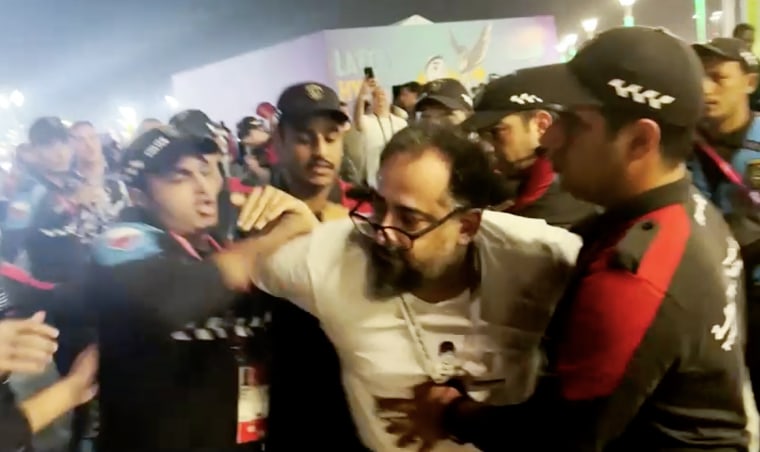Usually when a team gets knocked out of an international tournament like the soccer World Cup, the nation is united in grief, pride in their performance or a mixture of both. After Iran's loss to the United States on Tuesday, however, many Iranians cheered their players' failure, saying they represented the repressive theocratic regime rather than the people it violently oppresses.
On Tuesday, those criticizing the team made their voices heard: This was the Islamic Republic's loss, not Iran's. Horn-honking cars flooded the streets of Tehran and other cities, according to footage posted on social media.
In one of the videos, which was posted after the match, the man filming said those honking their horns on the capital’s Pirouzi Street were expressing "the joy of the people due to the loss."
Meanwhile, there were thousands of tweets in Persian, or in English from prominent Iranians, saying how happy they were their own team had fallen at the first hurdle of the competition.

"For 43 years the regime brainwashed Iranians to hate America," Masih Alinejad, a New York-based Iranian journalist and activist, tweeted . "But see how people across Iran are celebrating the victory of the U.S. soccer team against the Islamic Republic."
Dissident Iranian rapper Soroush Lashkari, better known by his stage name Hichkas (translation: nobody) wrote that “videos of Iranians celebrating the Islamic Republic team’s loss to the U.S. team are all over the internet.”
He said that real “Iranians don’t consider the terrorist regime” — meaning the country’s government — to be “Iranian.”
So Iran's short-lived stint at the World Cup was fraught with complex questions about loyalty and the national identity. Should the country’s 85 million people get behind a team bearing the name “Islamic Republic of Iran” — which is using brutal tactics to crush protests that have raged for more than two months?
The debate even played out inside Qatar's billion-dollar stadiums during Iran's three games, with fans backing the regime attempting to drown out supporters who criticized it.
Shortly after the U.S. match, scuffles erupted between Iranian protesters holding up portraits of outspoken former soccer player Ali Karimi, an icon of the protest movement, and a journalist from Iranian state-run media who was trying to film them, The Associated Press reported.
Two London-based Iranians, wearing T-shirts with the slogan of protests, were repeatedly harassed while talking to an AP journalist before the match.
After the game, some of the American players embraced their Iranian counterparts, who were in tears after the loss.
The protests started after a young Iranian woman, Mahsa Amini, died in a hospital three days after being detained in September by the country’s morality police for allegedly breaking the country's strict dress codes.
The protests for women’s rights have morphed into a wider and more diverse movement. Some protesters have called for an overthrow of the regime and “death to the dictator” — meaning Iran’s supreme leader, Ayatollah Ali Khamenei.

Where the Iranian soccer team fits into all this has been a subject of debate among Iranians and those watching from abroad.
For some government critics, the players were in an impossible position, with any display of dissent against the regime bringing the risk of retribution against their family members back home. And even so, the players unusually did not sing the national anthem ahead of their first game against England, and their captain, Ehsan Hajsafi, spoke in sympathy of those who died in the protests.
Others said the players did not do enough to use their platform to speak out against the violence and subjugation at home. They also pointed to a pre-tournament meeting in which some of the players bowed to Iran’s hard-line President Ebrahim Raisi.
While prominent members of Iran's diaspora feel able to criticize the regime under their own names online, many dissidents will only do so anonymously for fear of reprisals.
One user, posting under an anonymous name and using Amini's face as the avatar, summed it up: "Iran won. The Islamic Republic lost and was eliminated."

